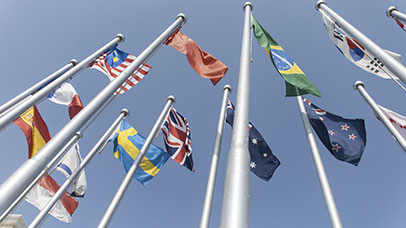Low-tax jurisdictions
Low-tax jurisdictions, so-called tax havens, are typically considered to mean countries with significantly lower effective tax rates compared with the average rates offered by other countries. In some cases, the corporate income tax rate is zero.
Governments determine the rate of corporate income tax and sometimes set low rates to attract investment from outside their borders. Most governments and international organisations, such as the OECD, respect the sovereign right of governments to determine tax matters.
Shell has a taxable presence in 99 countries and locations, with different tax regimes and varying corporate income tax rates. When we are present in low-tax jurisdictions, we are there for commercial reasons, such as crude oil trading and retail sites. These reasons can also include the presence of companies that hold investments or perform other services we need such as pensions, finance and insurance. In line with the Shell Responsible Tax Principles, we do not use these locations to avoid tax on activities that take place elsewhere.
Shell has a presence in many different countries and locations, which enables us to choose where to centralise the services that support our businesses. Before establishing any new company in a low-tax jurisdiction, we review the OECD’s substantial activities requirements. These ensure that companies operating in low-tax jurisdictions have real commercial substance and are not located there purely for advantageous tax reasons.
When we invest in a country, we consider factors which include accessibility to local or regional markets, the stability of the political, regulatory and social environment, local infrastructure and workforce. We also consider the overall costs of operation and the attractiveness and stability of a country’s fiscal regime. However, the investment must first meet our strategic, business or operational aims.
Reviewing entities in low-tax jurisdictions
In 2019, we launched a review of parts of our corporate structure against our Shell Responsible Tax Principles. The review focused on entities that are in low- or zero-tax jurisdictions. It considered the purpose of the entity and whether it should continue to be in that jurisdiction.
As a result of the review, we identified entities that are no longer active and that can be liquidated as a matter of good corporate governance. We also identified entities that can be restructured and held or operated from another jurisdiction. In other cases, our review concluded that the entities could remain in low- or zero-tax jurisdictions because there was a commercial reason for them being there.
For example, at the time of our review, Trinidad and Tobago was on the EU list of non-co-operative jurisdictions, which is sometimes referred to as the EU tax haven blacklist. However, we have substantial operational activity in the legal entities in the country, including exploration, production and liquefied natural gas (LNG) facilities. In 2019, our country-by-country report showed $3.4 million of corporate income tax paid and our Payments to Governments Report shows that Shell also paid around $177.1 million in production entitlements, royalties and fees. See Trinidad and Tobago to find out more about our operations.
The liquidation and restructuring of some entities in low-tax jurisdictions is now in progress.
Review of entities in low-tax jurisdictions
Sometimes, we acquire entities which may be located in low- or zero-tax jurisdictions. In 2019, we reviewed recently acquired entities, such as holding companies in St Lucia for Upstream and LNG operations in the Caribbean. Following this review, we consolidated the operations and simplified the holding structure. As a result, we have identified four St Lucian entities for liquidation.
In 2019, we ended our intragroup lending activities in Switzerland, as disclosed in last year's Tax Contribution Report. In 2020, we also ceased our lending activities in Bermuda. These activities are now carried out in the UK and the Netherlands.
Our Responsible Tax Principles apply to all the countries where we operate. In this report, we share more detail about low-tax jurisdictions in the country pages. Further information on entities and ownership is available in the 2019 Annual Report and Accounts.
 Message from the Chief Financial Officer
Message from the Chief Financial Officer
 Shell’s approach to taxes
Shell’s approach to taxes
 Special topics
Special topics
 Our tax data
Our tax data
